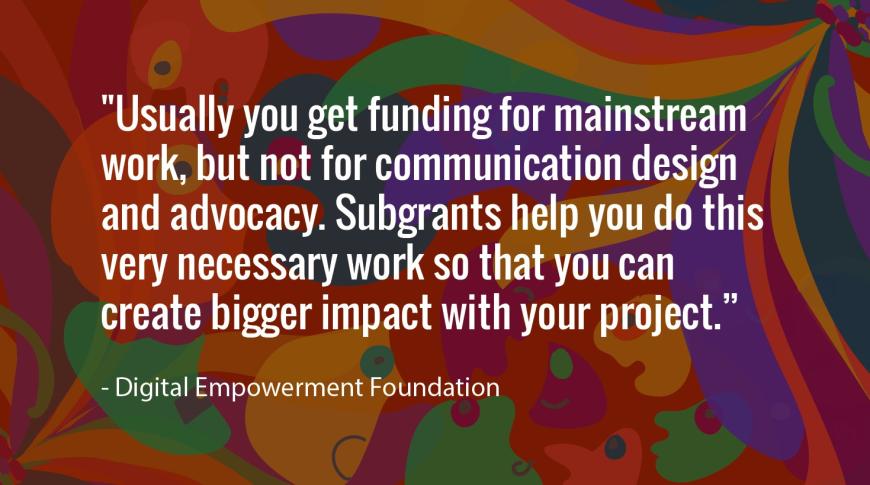
How are APC members improving their communities’ lives? In this column we're highlighting stories of those working to create local impact and change, supported by APC subgranting. Delhi-based not-for-profit organisation Digital Empowerment Foundation (DEF) works on bridging the digital divide in rural areas in India.
Challenging gender stereotypes
As an active member of the APC network, DEF has benefited from several APC subgrants – including a grant to support the work on community networks that it has been carrying out over the past 10 years. In partnership with the Connecting the Unconnected project, implemented by APC and Rhizomatica, DEF initiated a project named Barefoot Women Wireless Engineers, through which women were trained in setting up and troubleshooting the nodes of a community network. As a part of this project, DEF trained 24 women, mostly young, in functional digital literacy, followed by specialised training in internet and wireless networking.
This project not only helped bridge the digital divide, but also opened up avenues for an alternate livelihood opportunity for women. With internet access, opportunities also made their way to the people of the community.
“I never thought that I would be doing such work of connecting people through internet and wireless, which further gives them livelihood opportunities and access to information,” Talaria Amruta, one of the beneficiaries of the project, said.
E-waste dismantling as a means of livelihood for women
In 2018, DEF received an APC subgrant to work with women rag pickers in Mumbai, Moradabad in Uttar Pradesh, and Seelampur in Delhi, in an effort to raise awareness about the health harms of informal e-waste recycling. According to Anulekha Nandi, from the research and advocacy division in the organisation, “Women rag pickers are absolutely at the lowest rungs of society, and e-waste dismantling is a subsistence means of livelihood.”
Because of the “complicated networks” that make up informal recycling in India – and past experiences where NGO research into informal recycling had been followed by police raids – their work was difficult, even dangerous at times: “Most of the e-waste dismantling happened at night. At night these areas are very risky to go to given informal e-waste dismantling networks flowing into the grey market," Nandi explained. "Fieldworkers said that when they tried to create access, they tended to run up against people who warned them that they should not be asking questions.”
The complexity of the informal recycling grey market, and the dependence of communities on hazardous recycling practices, also make it a “morally difficult” terrain to navigate from a policy perspective, Nandi added. “In the case of Seelampur, there is a whole community whose livelihood depends on it. If you don’t have discarded technology there, I find it difficult to see how these communities could survive,” she noted. "Change needs to be incremental rather than outright abolishment of hazardous recycling practices. That’s where I find it necessary to be contextually sensitive.”
Despite the fact that DEF is a big organisation that accesses different sources of funding, APC’s subgranting programme has proved very useful to DEF, according to founder and director Osama Manzar. “Subgranting has allowed us to take short-term risks on burning issues that are not necessarily a part of our annual objectives,” he said. “It also allows us to supplement work we are already doing, which is the sugar coating on the cake you make.”
Elaborating on his sugar-coating analogy, Manzar added: “When you have done everything, and cooked everything, how do you make the finishing touch, those invisible elements that are missing from the main grant of the project? This small grant helps you do all those things that you miss out doing. Things like advocacy, creating outreach material, canvassing, doing campaigns, organising talks and sharing experience and knowledge,” he explained. “Usually you get funding for mainstream work, but not for communication design and advocacy. Subgrants help you do this very necessary work so that you can create a bigger impact with your project.”
Providing relief for the COVID-19 pandemic
With the outbreak of the COVID-19 pandemic, DEF’s work has become even more challenging, particularly taking into account the fragile condition of rural health infrastructure in the country. To respond to this crisis, they launched an ICT-enabled and community-specific relief programme, to supply relief across rural, marginalised and underserved locations of India.
To complement their ongoing relief programme, they also launched a COVID-19 Information Resource Kit, a crowdsourced resource pool for verified information on the novel coronavirus, available in English and Hindi, that includes facts about the virus, measures for sound physical and mental health, dos and don’ts during the pandemic, as well as addressing the misinformation around the virus.
This piece is a version of information highlighted by DEF as part of the project "Connecting the Unconnected: Supporting community networks and other community-based connectivity initiatives" for the Seeding Change column, which presents the experiences of APC members and partners who were recipients of funding through APC's community network learning grants, community network catalytic intervention grants, and subgrants offered through other APC projects and staff working on subgranting in the organisation.
Did this story inspire you to plant seeds of change in your community? Share your story with us at communications@apc.org